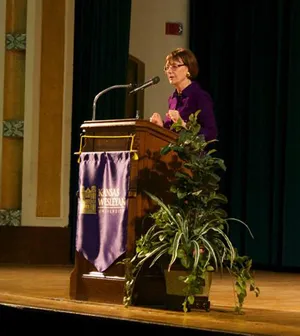President Chopp Advocates for Liberal Arts Education, Women in Leadership Roles

In separate events this past spring - one in a small town in rural Kansas and another in the heart of Manhattan - President Rebecca Chopp made compelling cases for two causes close to her heart: the future of the liberal arts and women in leadership.
In late March, Chopp returned to her native Kansas to deliver a lecture at Kansas Wesleyan on the role of women in leadership. Her talk, "21st Century Pioneers: Empowering Women to Take the Lead," was part of the university's Intersections lecture series. Chopp graduated from Kansas Wesleyan in 1974 and received an honorary degree from the school in 2010.
Upon her return home, she spoke with the Salina Journal about the impact Kansas Wesleyan and the liberal arts had on her career, the role of women in leadership positions, and the future of the liberal arts.
In the interview, Chopp - who was the first in her family to attend college - credits the liberal arts education she received at Kansas Wesleyan with sparking her career in higher education.
"Kansas Wesleyan had small classes with very innovative teachers and faculty," said Chopp, who attended Kansas State for one year before dropping out and enrolling at Kansas Wesleyan. "They had cutting-edge ideas in teaching, and I liked the liberal arts approach. I got to take all sorts of classes that gave me a life-long love of learning."
In discussing women in leadership roles, Chopp notes that while women still have a long way to go before they can level the playing field with men, women are particularly adept at skills necessary for contemporary leadership.
"Leadership in the 21st century is more about listening, communication, and consensus building, focused on interpersonal and creative relationships," she said, adding that women leaders have made great strides in the fields of religion, education, and medicine.
Chopp, co-editor of the new book Remaking College: Innovation and the Liberal Arts, also spoke passionately about the importance of liberal arts education.
"Students with a liberal arts education are more successful finding jobs and moving up faster," Chopp said. "It's so successful in producing leaders because you learn a variety of knowledge. It gave me an incredible education."
Read the full article on Chopp's visit to Kansas by the Salina Journal
In late April, Chopp discussed the future of the liberal arts as a panelist at the Value of a Liberal Arts Education and America's Future Symposium, sponsored by Fordham University's Center for Ethics Education.
At the event, Chopp addressed many of the challenges facing liberal arts education, but also highlighted the level of innovation that is already going on at institutions across the nation.
"These are tremendously resilient institutions with some of the smartest staff, faculty, and students in the world," said Chopp, who was joined on the panel by Colorado College President Jill Tiefenthaler, Deputy Under Secretary of the U.S. Department of Education Jamienne Studley, and Columbia University Professor of Humanities Andrew Delbanco.
Chopp cited three areas of broad innovation that will allow liberal arts colleges to overcome their current challenges: the redesigning of knowledge, the reshaping of intentional communities, and a reinvention of an "anthropology of wholeness." She also spoke at length about one challenge in particular - understanding today's generation of students, often referred to as "millennials."
Calling this generation dramatically different than any in the past 30 years, Chopp described millennials as "very confident, very engaged, very opinionated, and very hard-working." Yet for all their strengths, millennials' interpersonal skills often need work, as Chopp noted they often struggle to communicate "face to face and not just through [devices]," which she believes illustrates the importance of creating intentional communities.
"I don't think liberal arts need to be the only form of education, but they are a necessary form, " Chopp said in closing. "They are a necessary form for our democracy, they are a necessary form for our culture, and they are a necessary form for certain individuals."
Read a recap of the symposium by Fordham University



